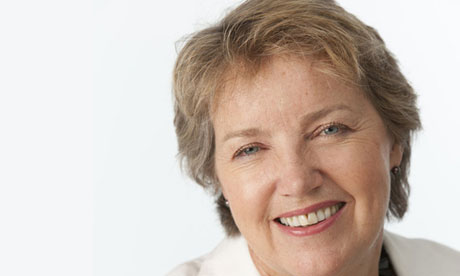
As reported, it has been announced that George Entwistle has been appointed the new BBC Director General. The corportation's COO Caroline Thomson narrowly missed out on the top spot and with the BBC passing over the opportunity to appoint the first ever female DG, Jane Martinson – Women's Editor at The Guardian – asks the question: what does a woman have to do to become the BBC's Director General?
Reposted from The Guardian
Bring out the bunting, wave the flags: a middle-aged man and former Newsnight editor is set to be director general of the BBC. Forgive the note of sarcasm. I have nothing against George Entwistle, by all accounts a thoroughly decent man who was picked today to run our national broadcaster despite his less-than stellar handling, as BBC Vision director, of the BBC's jubilee coverage. Yet so similar is he in outlook, temperament and background to the man he is to replace as director general that he is known internally as "mini-me".
Given that Mark Thompson was widely considered to have handled a difficult job well this, could be seen as no bad thing – a safe choice in a turbulent world. But today's appointment of a cookie-cutter BBC lifer, albeit with a good track record and few enemies, is not only uninspiring but raises the question: what does a woman have to do to be appointed head of the BBC? And if the British establishment continue to appoint in their own image in this way, what does that mean for diversity in Britain more generally?
This is not a call for indiscriminate positive discrimination, but if the government is as keen to do something about the lack of women leading big corporations as it claims to be, studying the detail of this appointment would be useful. And not just to decide which one of the candidates would be most likely to roll over and play dead the next time licence fee discussions come round.
Faced with enormous challenges for both the BBC and the media in general over the next five years, the BBC Trust, led by Lord Patten, appears to have paid serious consideration to a woman with a lot of relevant experience and given the job to a younger man anyway.
The first thing to say is that these comments are not based on personal preference. Of all the candidates I know Ed Richards best, having interviewed him at Ofcom a few times and I think all three leading candidates offer much that is impressive. It simply seems worth pointing out that Thomson's story is reminiscent of other times women have missed out on the top job – especially once we look at the key challenges facing the next DG.
The first of these is charter renewal and the next round of licence fee negotiations, set to start well ahead of 2016. As chief operating officer, Thomson led the BBC's fight for the survival of its last charter as well as negotiating the past two licence fee settlements. In doing so, she acted as essential support for Mark Thompson, who was given credit for safeguarding the continuation of the charter itself, even if the licence fee was effectively curtailed. So common is this notion of women playing "second fiddle" that one BBC insider even referred to her as having played a series of "wifely roles" today. In playing this vital part, Thomson is understood to have gained key political contacts. Of course, this and her brief tenure in the 1980s as political assistant to Roy Jenkins, then the leader of the SDP, may not have endeared her to Patten.
The next major challenge for the BBC is to cut another 20% from running costs as it aims to do more with the same amount of money. Thomson was again heavily involved in the last excruciating round of cuts and has masterminded the move to and refurbishment of Broadcasting House to boot – a considerable task.
But one of the most important challenges facing the next DG is programming, and here Entwistle, an award-winning Newsnight editor with success in a range of other programming, including science and arts, can claim credit. Especially as Thomson more or less stopped working on programming when she became a manager and rejoined the BBC from Channel 4 in 1996.Technology is the other great challenge facing the BBC and here neither of the two top candidates have much in the way of a track record.
There are many good things about George Entwistle, not the least the very few voices either internally or externally against the appointment of this erudite man. His decision to take a pay cut by succeeding Jana Bennett as head of BBC Vision last year is also to be lauded. It just seems a shame that the other nickname he won because of this act — the Monk — also reminds us that the BBC and other parts of the British ruling classes can sometimes seem like a brotherhood.
For regular news, updates and opportunities, follow us on Twitter at @Scene_TV and 'Like' the Facebook page: www.facebook.com/SceneTV

